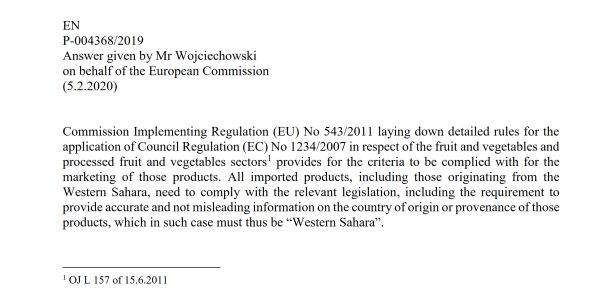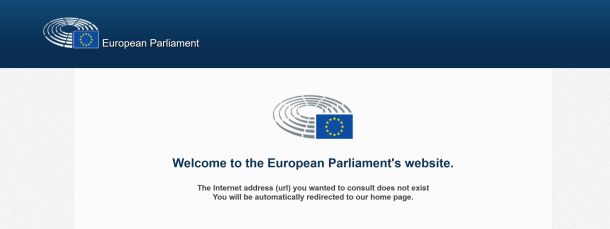L'ONU est claire que le représentant du peuple du Sahara Occidental est le Front Polisario. Alors qu'en est il, quand la Cour de justice dans son arrêt du 21 décembre 2016 a déclaré que les échanges commerciaux UE-Maroc ne pouvaient pas inclure le territoire du Sahara Occidental sans obtenir au préalable le consentement des représentants du territoire ?
L'approche de l'UE a consisté en quatre étapes.
Premièrement, il a conclu les négociations avec le Maroc le 31 janvier 2018 avant d'entamer tout processus visant à recueillir un consentement des sahraouis.
Deuxièmement, il a remplacé la notion de «consentement préalable» par «postconsultation».
Troisièmement, il a fait une sélection principalement «marocaine» de groupes à consulter.
Quatrièmement, il a nommé rencontre avec le Polisario, dans laquelle ce dernier a clairement condamné les pratiques de l'UE, comme si le Polisario avait été invité à être consulté.
Cela donne l'impression que l'UE est engagée dans un large dialogue de consultation des parties prenantes, dans lequel même le Polisario est inclus. Lors de l'audition au Parlement le 20 février, le chef de la Division du Maghreb du Service européen pour l'action extérieure (SEAE) a précisé avec quels groupes le SEAE était en dialogue. Le commentaire ci-dessous a été fait par le fonctionnaire du SEAE lors de la réunion du 20 janvier (accent mis en gras par Western Sahara Resource Watch).
Sur la base de la présentation par le SEAE, WSRW a envoyé un courrier, avec 17 questions. Voyez cette lettre ici.
Le 5 février 2018, Western Sahara Resource Watch a déclaré au SEAE qu'il ne participerait pas à une réunion à laquelle il avait été invité, car nous ne voulions pas contribuer à une tentative apparente de légitimer un processus de négociation qui méconnait complètement le droit du peuple du Sahara occidental à être consulter et donner son assentiment.
Statement by Mr. Vincent Piket, Head of the Maghreb Division in the EU External Action Service, in the INTA Committee, 20 February 2018
“Thank you very much, indeed. The Council Secretariat has sent to the Parliament the negotiation mandate, so you will have read in that what Member States expect the Commission and the External Action Service to provide.
As regards the involvement of the people concerned by the amendment, the involvement procedure of the people concerned has started. We have set out a program of meetings that is taking place both in Rabat and in Brussels. We have selected for that purpose a list of interlocutors that is very wide-ranging, very diversified. There are Members of Parliament in there, there are members of the regional councils from Western Sahara, we have socio-economic stakeholders in our list of interlocutors; the Chambers of Commerce, Fisheries and Agriculture Chambers particularly from venues inside Western Sahara, Dakhla and El Aaiun in particular. Research institutes, we have economic operators and the development agency of Western Sahara.
And a third category is civil society organisations in the strictest sense, focusing on human rights, particularly human rights of the Saharawi people. We have quite a variety of them. All organisations are registered in Morocco, that was one condition for us: to be able to speak to registered organisations. But we have a very broad spectrum there. Both organisations that are politically neutral so to say, as well as organisations, NGO organisations that are very supportive of Polisario. I mention Polisario: Polisario is also in our list of interlocutors and we met with them early in February.
Now the work is not yet done. We are let’s say roughly halfway, maybe more than that, in our meetings, and we hope to conclude them by the end of this month. And we hope to have gotten on that basis a very reliable insight into how the people concerned by the agreement in Western Sahara feel about this amendment: whether they see the benefit of it or not, in the economic or socio-economic sense, and whether there are any other objections to it, or other kinds of support for it.
So the findings of our meetings will be laid down in the report that the Commission will be sending to the Council and to Parliament, together with the official amendment proposal. So I will not go into the content of that just yet because the exercise is still ongoing.
Lastly I should say that the Moroccan authorities on their side will also be conducting a consultation exercise. The government is going to ask for a vote on the amendment in two levels: first of all in the external relations committee of the House of Representatives on a national level, and secondly, they’re going to call for votes in the regional councils of Western Sahara. That’s councils that look more at the regional, local interest. By holding those votes, the government of Morocco will – in their report on that – itemize in particular the voting behavior of the Saharawi people both at the level of the national assembly as well as at the level of the regional councils, in order indeed to be able to see the level of support for this amendment of that particular group of MPs and deputies.
Thank you.”
La Commission de l'UE recule sur l'étiquetage des produits du Sahara
Quelle est la position de l'UE sur l'étiquetage des produits du Sahara Occidental occupé ? La Commission européenne a publié pour la troisième fois une réponse à une question parlementaire sur le sujet, mais la dernière version ne répond pas à la question.
Pourquoi cette déclaration de l'UE continue à disparaître ?
Une clarification de la Commission Européenne sur l'étiquetage des produits du Sahara Occidental a été publiée, puis supprimée, puis publiée à nouveau et a été supprimée à nouveau des sites Internet de l'UE.
Confirmation: les produits du Sahara Occidental à étiqueter comme tels
Il y a deux semaines, la Commission européenne a annoncé que les produits du Sahara Occidental doivent être étiquetés comme tels, pour retirer cette déclaration dès le lendemain. Aujourd'hui, la Commission réaffirme sa position initiale.
Retournement spectaculaire de la CE sur l'étiquetage du Sahara
Le 5 février 2020, la Commission européenne a annoncé que les produits du Sahara Occidental devraient être étiquetés en conséquence. Mais environ 24 heures plus tard, toutes les traces de cette déclaration ont été supprimées des sites Web de l'UE.



